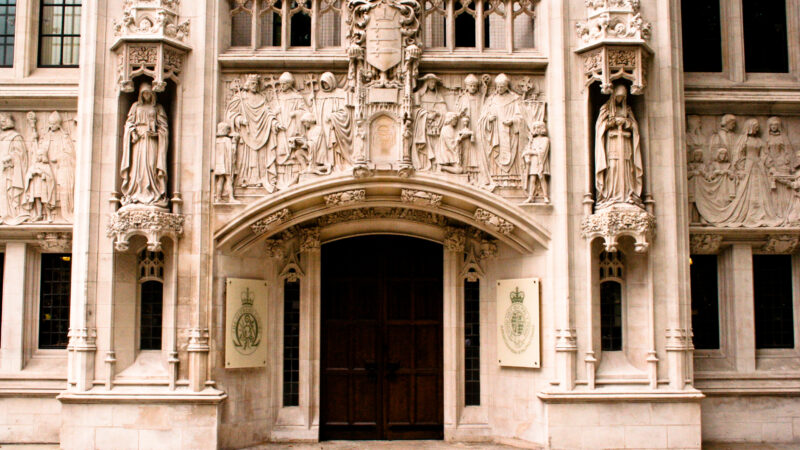
Labour has issued new guidance that Constituency Labour Parties and branches should not submit motions that advocate that the party take an “unlawful position” with respect to the Supreme Court judgement on the definition of a woman, LabourList can reveal.
The guidance was quietly published as part of a “Supreme Court Judgement FAQs” section of Labour’s website.
One of the FAQs says: “Can we discuss the decision of the Supreme Court at a Branch/CLP meeting?”
Labour’s guidance states in response: “We recognise that the judgment of the Supreme Court in this matter is of significant importance to many members.
READ MORE: Which ministers have done the most and fewest broadcast rounds in year one?
“Discussions on the decision of the Supreme Court may be competent business for CLP or Branch meetings but motions that advocate that the Party take an unlawful position with respect to the Supreme Court judgment are not competent business for a CLP or Branch.
“Any discussion of the Supreme Court judgment must be conducted with sensitivity, respect and compassion.
“Behaviour that does not reflect our shared values as a Party and may breach our rules or codes of conduct will be dealt with via the Party’s complaints procedures.”
The gender-critical campaign group Labour Women’s Declaration said: “We welcome our party’s sensible approach and commitment to comply with Labour’s Equality Act, as set out here.
“Revising its data collection as per the Sullivan Review recommendations must now be a priority in order to deliver this obligation. However, along with women throughout the Labour party, we deplore the cancellation of Annual Women’s Conference. We call on our party to honour its constitutional commitment to strengthening women’s voices via National Women’s Committee, women’s conference and women’s branches.
“We note that our Labour party requires affiliate organisations, including socialist societies such as LGBT Labour, to conform to the party’s procedures as set out here.”
Subscribe here to our daily newsletter roundup of all things Labour – and follow us on Bluesky, WhatsApp, Threads, X or Facebook.
But Georgia Meadows, LGBT+ Labour national trans officer, said of the ban: “In what is a long and historied fight between the leadership and membership, this is, unfortunately, hardly surprising.
“BLPs and CLPs should have every right to pass whatever motion they like, particularly now that the party is in Government and can change the law from the confused and paradoxical situation the Supreme Court has placed us in. The idea that members should be restricted in asking for that, especially considering how thoroughly this likely undermines international law, is utterly reprehensible.
“This guidance’s claim that ‘The Supreme Court judgment does not reduce or remove the legal protections against discrimination for those with the protected characteristic of gender reassignment’ is simply untrue if the rest of the guidance is to be presumed to be legally accurate.
“It completely undermines the purpose of the Gender Recognition Act, which was to ensure that trans men could live as men and trans women could live as women in all aspects of their lives. The guidance is entirely trans-exclusionary in that regard. It utterly undermines not only trans people’s identities but also precedents set under the European Convention on Human Rights in recent years and since its Inception.”
LGBT+ Labour
It comes after LGBT+ Labour suspended its annual general meeting and committee elections, citing worries of legal action over trans candidates running for roles reserved for women.
The AGM for the party’s affiliated socialist society for LGBT+ members was due to take place in north London on July 19, and the cancellation has prompted criticism from activists running on a pro-trans rights slate.
But the affiliated socialist society emailed members suggesting it was not confident it could run the event without significant legal risks to the group and its officers, in light of the recent Supreme Court decision and equalities watchdog guidance on the definition of a woman under the Equality Act.
The group said in an email to members that the decision was made with “the wellbeing of our members at the forefront”, and it called on the Equality and Human Rights Commission (EHRC) to provide “clear, practical, and workable guidance” that helps organisations uphold the “rights and dignity” of all members.
This followed a new group, called the Trans Rights Alliance, backing a large slate of candidates in the elections, including chair and women’s officer.
The full new Labour guidance is available here on a party FAQ page.
Labour was approached for comment.
- SHARE: If you have anything to share that we should be looking into or publishing about this story – or any other topic involving Labour– contact us (strictly anonymously if you wish) at [email protected].
- SUBSCRIBE: Sign up to LabourList’s morning email here for the best briefing on everything Labour, every weekday morning.
- DONATE: If you value our work, please chip in a few pounds a week and become one of our supporters, helping sustain and expand our coverage.
- PARTNER: If you or your organisation might be interested in partnering with us on sponsored events or projects, email [email protected].
- ADVERTISE: If your organisation would like to advertise or run sponsored pieces on LabourList‘s daily newsletter or website, contact our exclusive ad partners Total Politics at [email protected].




More from LabourList
Sadiq Khan signals he will stand for a fourth term as London Mayor
Starmer or Sarwar: Scottish Labour MSPs and MPs split over Keir Starmer’s future
‘Every Lidl helps: What can the Government do to bring down food prices?’